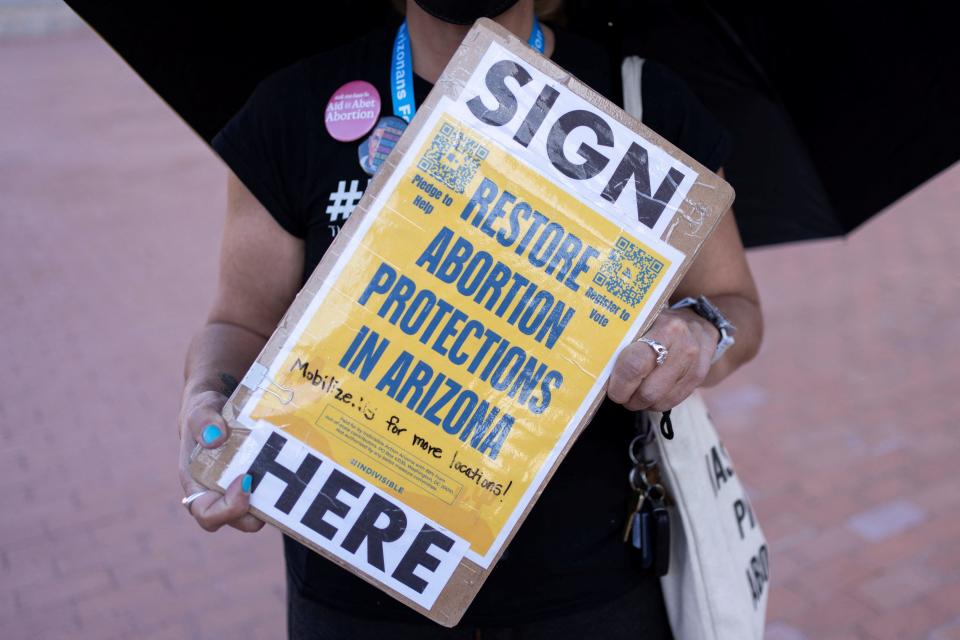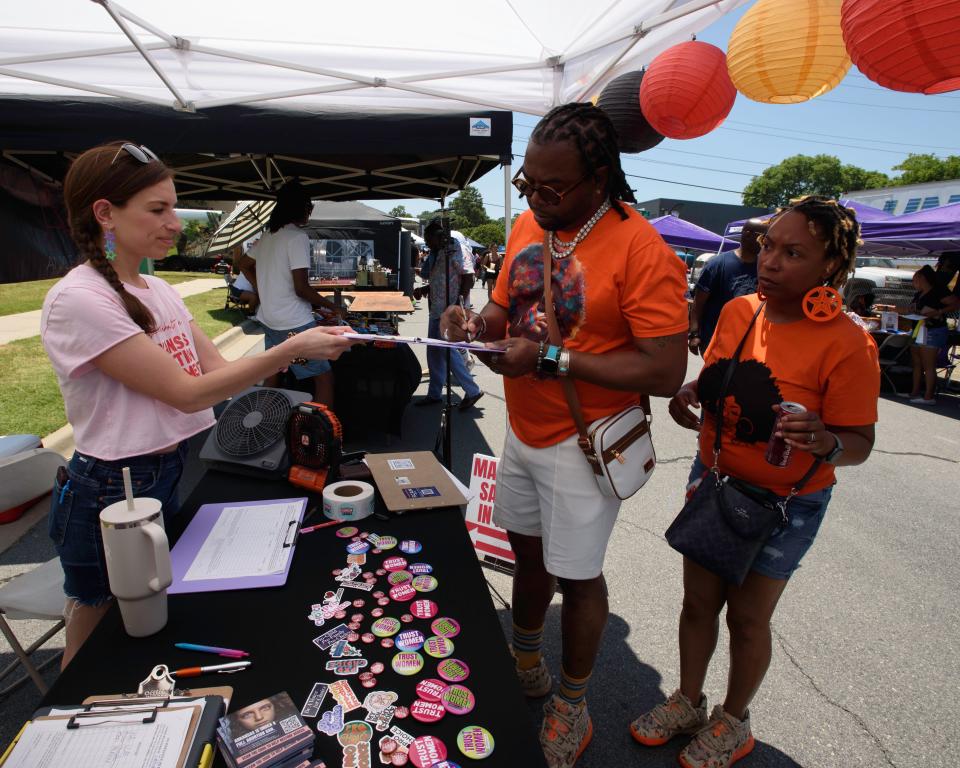Voters will get to weigh in on abortion come November — in red and blue states alike
Across America, including in conservative states like Nebraska and Arkansas, every proposed ballot measure to restore or expand abortion access gathered enough signatures to make November's ballot. Voters in 11 states this fall could vote on abortion, if those signatures are certified and the measures survive legal challenges.
For 50 years, the U.S. Supreme Court's Roe v. Wade decision gave women in America access to abortion until fetal viability, around the 24th week of pregnancy. The Dobbs decision in 2022 overturned those national protections for abortion, and states adopted a range of policies, from near total bans to broad access in line with the Roe standard.
In states that allow voter-driven ballot measures, abortion rights groups have used the tool to push back against restrictions. In past elections, voters even in conservative states like Ohio and Kansas have shown a willingness to support these abortion ballot measures.
Now, abortion could become an even more high-profile issue come November. Vice President Kamala Harris, the likely Democratic presidential nominee, has been a forceful advocate for abortion access and will likely make the issue central in her campaign against Republican Donald Trump.

Support across the country
"I've been doing this work for a long time, and I've never felt the kind of energy and enthusiasm that we currently have with Americans across the county," said Caroline Mello Roberson of Reproductive Freedom for All, an abortion rights advocacy group that campaigned for ballot measures campaigns in Arizona, Nevada and Michigan.
In Arizona, where the state Supreme Court's reinstatement of a strict, 19th century anti-abortion law made national news, organizers of a measure to allow abortions until fetal viability this month submitted 800,000 signatures, or around 20% of the state's eligible voters.
"A very broad majority supports this issue, and that's whether we were in rural communities or cities, whether we were in largely red, conservative districts or more progressive areas of the state," said Dawn Penich, a spokesperson for the Arizona organizers.
Voter-initiated ballot measures have already been approved for the November ballot in Colorado, Florida, Nevada and South Dakota. In Maryland and New York, legislators have put forward ballots measures that add abortion-related protections to the state constitutions.
The signatures submitted in Arizona, Arkansas, Missouri, Montana and Nebraska still need to be certified by the states before the measures appear on the November ballot. Any of these measures could also be challenged in court.
New York's proposed constitutional amendment extending abortion rights, for example, was pulled from the ballot by a state judge in May before being restored by higher courts.
And some abortion access efforts in conservative states may also face opposition from state officials.
In deep red Arkansas, where abortion currently is allowed only to save the life of a mother, organizers of a ballot measure to restore broader access submitted more than 100,000 signatures. A week later, the Republican secretary or state rejected those signatures on a technicality. The ballot measure organizers are challenging that decision in court.

Countering with confusion
Meanwhile, some of the abortion rights groups have complained their ballot measures have been intentionally mischaracterized by their opponents. In some cases, the opposition have used underhanded tactics.
In Nebraska, signers were confused by two similarly named ballot initiatives, one seeking to expand abortion rights, and the other aiming to restrict them. Organizers for Protect Our Rights, the reproductive rights advocacy campaign, said they heard voters were deceived into signing the opposing Protect Women and Children petition.
According to the Nebraska Examiner, more than 300 people submitted affidavits with the Secretary of State's Office to get their names off Protect Women and Children's petition, while 12 did the same for the Protect Our Rights initiative.
Creating opposing ballot measures is a common tactic used by opposition groups to confuse voters about what ballot initiatives aim to do, according to Chris Melody Fields Figueredo, executive director of The Ballot Initiative Strategy Center, a group that supports progressive ballot initiatives.
“Because of how widely successful reproductive freedom ballot measures have been, we are seeing this as a tactic used to confuse and intimidate voters at the ballot,” she said.
In Arkansas, an email went out to supporters of the abortion ballot measures on July 4, a day before the signature deadline, saying the organizers had reached their goal and volunteers should take the day off and celebrate. The organizers say their email list was stolen, and they believe the unauthorized message was sent to discourage the final push to gather signatures.
The conservative Arkansas Family Council also published the names of paid canvassers and the towns where they were working. The ballot organizers characterized the publication as doxxing and an attempt to intimidate the canvassers, while the Arkansas Family Council countered that posting the publicly available information promoted election transparency.
What makes ballot measures different
"There's no secret that ballot measures have been a problem. That's because pro-lifers have been outspent," said Kelsey Pritchard of Susan B. Anthony Pro-Life America, which campainged against abortion measures in conservative states like Arizona, South Dakota and Florida.
Since the Dobbs decision, Pritchard said, many Republican politicians have shied away from embracing an anti-abortion position.
Ballot measures isolate issues, and remove them from the extreme partisanship of American politics today, said Fields Figueredo. Voters are more willing, she believes, to cross party lines to support an issue like abortion when it is separated from a political candidate.
"People are reading the ballot measure from the perspective of how this is going to impact themselves and their community," she said.
Here is where proposed abortion ballot measures stand across the country:
Arizona
Arizona made national news in April when the state's Supreme Court upheld an 1864 law that imposed a near total ban on abortion. The legislature later overturned that Civil War-era law. Abortion rights organizers collected more than 800,000 signatures, double the amount needed, for a constitutional amendment that would create a right to abortion up until the fetus becomes viable.
Arkansas
Despite no support from national abortion rights groups, organizers gathered more 100,000 signatures for a proposed constitutional amendment that would allow unrestricted abortions in the first 18-weeks after fertilization with exceptions later in the pregnancy for rape, incest and the mother's health. The Arkansas Secretary of State rejected the submitted signature due to a missing form, but the organizers filed suit to challenge that decision. Current Arkansas law allows abortion only to save the mother's life, and no abortions were performed in the state last year.
Colorado
Colorado already has extensive protections for abortion, including laws shielding doctors who perform abortions on patients from out of state. But a ballot initiative led by reproductive rights supporters would enshrine the right to abortion in the state constitution. The initiative would also bar the government from prohibiting the coverage of abortions through health insurance plans, including for public employees and for publicly funded health care plans. An opposing initiative aimed at banning abortion failed to gather enough signatures to get on the ballot.
Florida
In May, Florida banned almost all abortion after six weeks of pregnancy. Before that law went into effect, the state had some of the least restrictive abortion laws in the Southeast, and more than 7,000 women traveled to the state from across the region for the procedure. A voter-driven measure already approved for the November ballot, however, would restore abortion access up to fetal viability. The measure must be approved by 60% of the voters to pass.
Maryland
A ballot measure, proposed by the state legislature, would enshrine abortion protections in the state's constitution. Current state laws, enacted by a voter-driven ballot initiate in 1991, provide broad access to abortion.
Missouri
Reproductive rights supporters in Missouri are attempting to scale back the state’s near total abortion ban through a ballot initiative that would enshrine the right to the procedure in the state's constitution. Missourians for Constitutional Freedom, a coalition of abortion rights activists, submitted more than 380,000 signatures in May, which local election officials have until July 30 to certify. The group has faced challenges from anti-abortion groups, which have led an aggressive “Decline to Sign” campaign.
Montana
Abortion rights proponents in Montana recently submitted 117,000 signatures, nearly double the required amount, for a ballot initiative that would enshrine the right to abortion in the Montana Constitution. Currently, abortion is legal in the state up to fetal viability. The campaign had less than 80 days to collect signatures after Attorney General Austin Knudsen challenged the initiative in court, narrowing the signature collection window.
Nebraska
Two opposing ballot initiatives submitted signatures: one aiming to enshrine the state's current 12 week abortion ban in the Nebraska Constitution, and the other seeking to extend abortion access up to fetal viability. Protect Our Rights, the group supporting abortion access in the state, broke a record for the number of signatures submitted for a ballot initiative in Nebraska with around 207,000. Protect Women and Children, the anti-abortion campaign, came in close with 205,000 signatures in only 97 days. If both initiatives make it on the ballot, the one that receives the most votes in November will pass.
Nevada
In June, a ballot initiative enshrining abortion rights in the Nevada Constitution got the green light for the November ballot after receiving more than 200,000 signatures. Nevada currently has a 1990 law in place allowing abortions for the first 24 weeks of pregnancy or later to protect the health of the pregnant person. The proposed amendment would enshrine this access in the state constitution. Voters would have to approve the initiative in both 2024 and 2026 to amend the state constitution.
New York
The Equal Rights Amendment, a constitutional amendment put forward by state lawmakers, would bar discrimination against a woman who had an abortion. New York allows abortions through the 24th week of pregnancy. The amendment would also bar discrimination based on sexual orientation, gender identity, ethnicity and national origin.
South Dakota
South Dakotans will decide whether to enshrine abortion rights into the state constitution this November after a ballot initiative aiming to do so was approved in May. Along with scaling back the state’s near total abortion ban, the initiative would allow for abortions in the first trimester while also allowing the state, in the second trimester, to “regulate the pregnant woman’s abortion decision and its effectuation only in ways that are reasonably related to the physical health of the pregnant woman.” The amendment would also create an exemption for abortions to “preserve the life and health” of the woman in the third trimester.
Contributing: George Fabe Russell
This article originally appeared on Nashville Tennessean: Abortion ballot measures in November 2024: A state by state guide
Solve the daily Crossword

